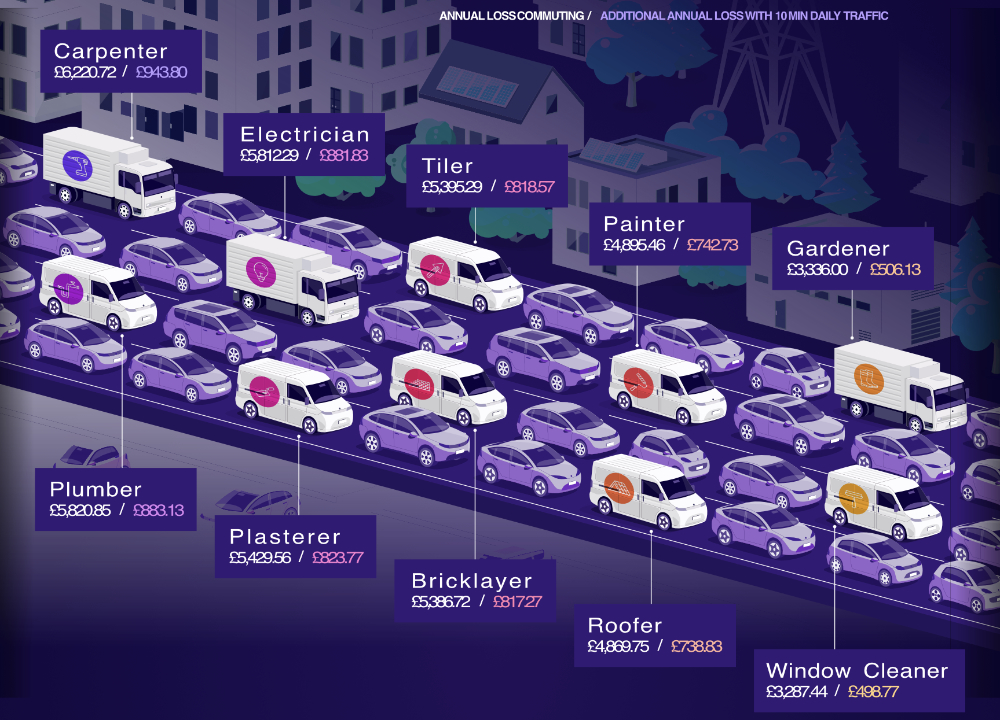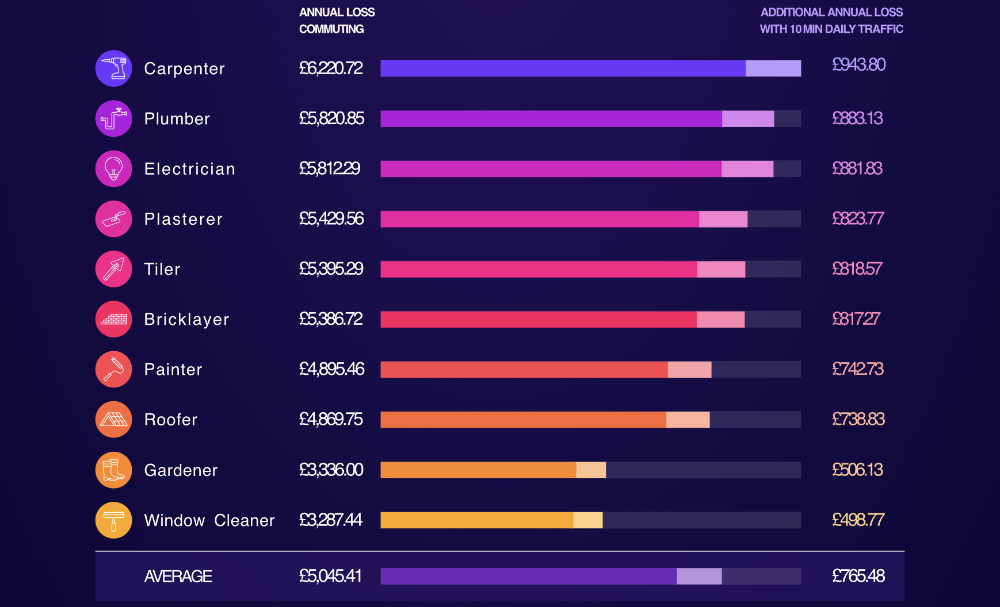Congestion between jobs could be costing tradespeople up to £5,045 a year
A van insurance and automotive specialist company conducted a poll to determine the average commute time for 10 high-demand trades in the UK. By comparing this commute time with the average salary of each trade, they unveiled the monetary value of time spent on travel. This analysis is particularly relevant as traffic and congestion on roads continue to increase.
Contents |
[edit] The study
The study, carried out by Zego, found that the average tradesperson in the UK travels 65.91 minutes every working day, meaning it could cost up to £5,045 annually in their time. For those who travel long distances between jobs, that cost could be much higher. This is particularly important when considering that many tradespeople don’t receive payment for their time until they have got to and completed the job.
[edit] Tree roots
A carpenter's time was recorded as the most expensive, potentially losing over £6,221 in travel
The poll, that the average distance travelled by tradespeople is 66 minutes each day, taking into account traffic and other factors. According to this data on the time spent travelling compared to the average salary, a carpenter's time is the most costly. Travelling between jobs could cost a carpenter up to a staggering £6,221 every year - proving time is money on the busy roads.
Carpenters, incidentally, are also the second most in-demand trade of the 10 trades Zego analysed, along with joiners, experiencing unprecedented demand.
[edit] Water ways
Plumbers round up the second spot, with their average travelling distance for jobs potentially costing them up to £5,821 a year. It’s reported that the UK needs up to 72,000 new plumbers by 2032, meaning travelling time could increase as the demand for jobs continues. On the dates analysed, there were 2,093 plumber jobs solely on Indeed, indicating that the demand is growing.
[edit] Spark plugs
Electricians have the third most valuable time when looking at travel distance and average salary, with commuting for them valued up to £5,812.
[edit] Clean screens
Of the 10 trade jobs analysed, window cleaners ‘lose’ the least when it comes to travelling for jobs. However, that cost is still a huge £3,287 each year.
Just 10 minutes of traffic each day costs UK van drivers £765 annually
Zego’s study found that in the UK, carpenters are the worst off, with the tradies potentially missing out on £944 by sitting in their van waiting to move between jobs. Similarly, 10 minutes of additional traffic could cost plumbers up to £883 and electricians up to £882.
This article was issued via press release from Evolved search on behalf of Zego as "Time is money: Congestion between jobs could cost UK tradespeople up to £5,045 each year" dated February 27, 2024, sub headings added by editor.
[edit] Related articles on Designing Buildings
Featured articles and news
ECA progress on Welsh Recharging Electrical Skills Charter
Working hard to make progress on the ‘asks’ of the Recharging Electrical Skills Charter at the Senedd in Wales.
A brief history from 1890s to 2020s.
CIOB and CORBON combine forces
To elevate professional standards in Nigeria’s construction industry.
Amendment to the GB Energy Bill welcomed by ECA
Move prevents nationally-owned energy company from investing in solar panels produced by modern slavery.
Gregor Harvie argues that AI is state-sanctioned theft of IP.
Heat pumps, vehicle chargers and heating appliances must be sold with smart functionality.
Experimental AI housing target help for councils
Experimental AI could help councils meet housing targets by digitising records.
New-style degrees set for reformed ARB accreditation
Following the ARB Tomorrow's Architects competency outcomes for Architects.
BSRIA Occupant Wellbeing survey BOW
Occupant satisfaction and wellbeing tool inc. physical environment, indoor facilities, functionality and accessibility.
Preserving, waterproofing and decorating buildings.
Many resources for visitors aswell as new features for members.
Using technology to empower communities
The Community data platform; capturing the DNA of a place and fostering participation, for better design.
Heat pump and wind turbine sound calculations for PDRs
MCS publish updated sound calculation standards for permitted development installations.
Homes England creates largest housing-led site in the North
Successful, 34 hectare land acquisition with the residential allocation now completed.
Scottish apprenticeship training proposals
General support although better accountability and transparency is sought.
The history of building regulations
A story of belated action in response to crisis.
Moisture, fire safety and emerging trends in living walls
How wet is your wall?
Current policy explained and newly published consultation by the UK and Welsh Governments.
British architecture 1919–39. Book review.
Conservation of listed prefabs in Moseley.
Energy industry calls for urgent reform.






























